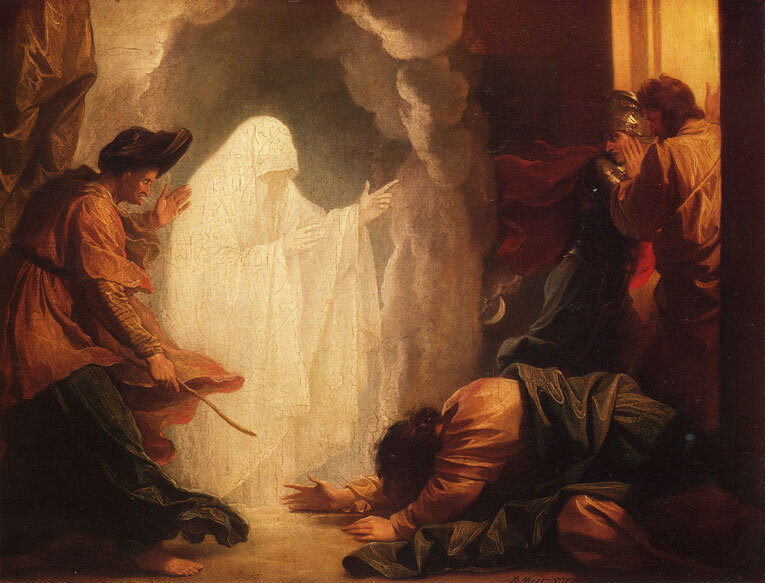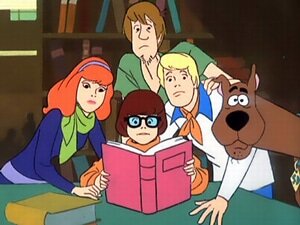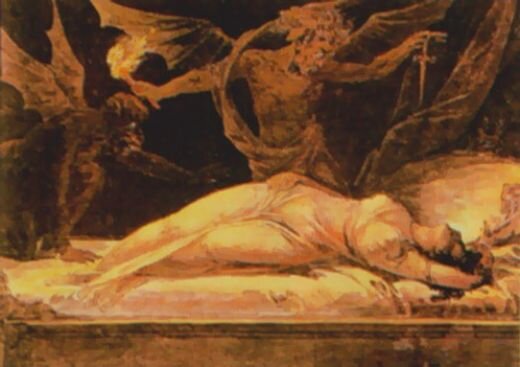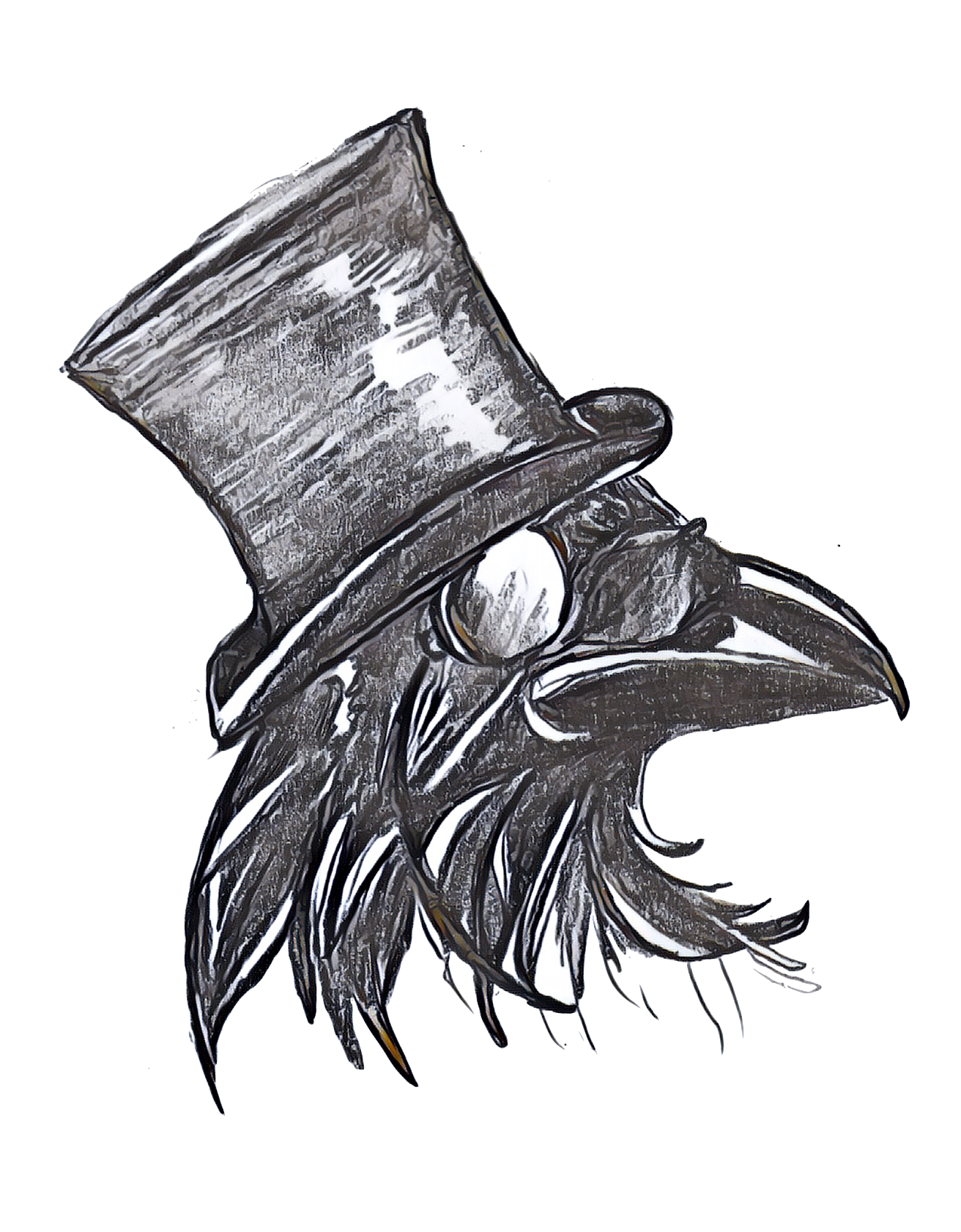What are ghosts?
 Just what are ghosts? Have you ever thought you saw a ghost or said to yourself, "Egad. I see ghosts!" What are you seeing, exactly?Some people report seeing the disembodied spirits of humans, which sometimes appear to them, sometimes haunt certain locations, and sometimes reenacting the violence that led to their demise.
Just what are ghosts? Have you ever thought you saw a ghost or said to yourself, "Egad. I see ghosts!" What are you seeing, exactly?Some people report seeing the disembodied spirits of humans, which sometimes appear to them, sometimes haunt certain locations, and sometimes reenacting the violence that led to their demise.
There’s No Such Thing As Ghosts
 My favorite show as a child was the cartoon Scooby Doo. I watched it every day on WGN after school, except when the Chicago Cubs were on… reason enough for my disdain of the Cubs!In that particular iteration of the Scooby Doo franchise, the Mystery Gang often came across some ghostly mystery. “There’s no such thing as ghost,” Velma or Fred would invariably declare, and they’d prove it by unmasking the villain, pretending to be a ghost.This presented a materialist view of ghosts: there aren’t any. That view set very well with me, and agreed with what my Pentecostal pastor told me when I asked if there were such things as ghosts. Later, when I became an atheist and embraced the materialist worldview, this view continued to sit very well.Many people hold this view. Any “ghost” can be explained through naturalistic causes. Things that went "bump in the night" were easily explainable once you set aside the spirit of fear.
My favorite show as a child was the cartoon Scooby Doo. I watched it every day on WGN after school, except when the Chicago Cubs were on… reason enough for my disdain of the Cubs!In that particular iteration of the Scooby Doo franchise, the Mystery Gang often came across some ghostly mystery. “There’s no such thing as ghost,” Velma or Fred would invariably declare, and they’d prove it by unmasking the villain, pretending to be a ghost.This presented a materialist view of ghosts: there aren’t any. That view set very well with me, and agreed with what my Pentecostal pastor told me when I asked if there were such things as ghosts. Later, when I became an atheist and embraced the materialist worldview, this view continued to sit very well.Many people hold this view. Any “ghost” can be explained through naturalistic causes. Things that went "bump in the night" were easily explainable once you set aside the spirit of fear.
Ghosts are demons?
 One of the supernatural views of ghosts is held by many evangelical Christians.This view of ghosts declares that any manifesting spirit is actually a demonic spirit masquerading as ghosts, for the purpose of creating fear and deception.An example of interpreting a ghostly appearance from this perspective would be when someone goes to a psychic and asks to speak to a dearly departed loved one. Perhaps the dead relative forgot to reveal the location of the will before passing. So the family contacts a psychic, who breaks through the cosmic veil to the other side, brings the ghost forth, asks for the hidden knowledge, and then reveals it to the relative. Many Christians interpret this situation as the psychic actually consulting a familiar spirit (a demonic spirit), who, through the network of spirits that watch us, has received the hidden information from a watcher spirit. The point of revealing even accurate information is to foster rebellion and sin, open spiritual doorways to demonic presences, and to deflect faith from the God who loves us.Typically, people who interpret ghostly apparitions this way believe that when someone dies, the spirit goes to God, who then sends it to heaven or hell. No one remains on this side of the cosmic veil. Some believe that human spirits actually become angels.
One of the supernatural views of ghosts is held by many evangelical Christians.This view of ghosts declares that any manifesting spirit is actually a demonic spirit masquerading as ghosts, for the purpose of creating fear and deception.An example of interpreting a ghostly appearance from this perspective would be when someone goes to a psychic and asks to speak to a dearly departed loved one. Perhaps the dead relative forgot to reveal the location of the will before passing. So the family contacts a psychic, who breaks through the cosmic veil to the other side, brings the ghost forth, asks for the hidden knowledge, and then reveals it to the relative. Many Christians interpret this situation as the psychic actually consulting a familiar spirit (a demonic spirit), who, through the network of spirits that watch us, has received the hidden information from a watcher spirit. The point of revealing even accurate information is to foster rebellion and sin, open spiritual doorways to demonic presences, and to deflect faith from the God who loves us.Typically, people who interpret ghostly apparitions this way believe that when someone dies, the spirit goes to God, who then sends it to heaven or hell. No one remains on this side of the cosmic veil. Some believe that human spirits actually become angels.
Ghosts are the Human Dead
A popular conception of ghosts, the view propagated by most paranormal researchers (a.k.a. ghost hunters), psychics, and popular culture at large, holds that when someone dies, for whatever reason, the spirit does not cross over to the other side and instead becomes a ghost. The reasons for this include
- Death by a traumatic event, murder, car accident, etc.
- Unfinished business to attend to
- May not realize they have died
- Emotionally distraught loved ones
- Emotional connection to loved ones
- Cannot rest due to injustice done against them
- Fear of judgment
A History of the word Ghost
 The English word “ghost” has a long history[ref]This section relies on the Oxford English Dictionary (OED), which not only provides modern definition of English words, but also every definition an English word had at any time in history, complete with a reference of its use. The OED's listing for ghost is quite long and fascinating.[/ref].“Ghost” is derived from an old Teutonic word ,which includes these meanings: “fury, anger, terrify, to wound, tear to pieces.”In about 1200 AD, “ghost” had at least three meanings: “a good spirit, an angel”, “an evil spirit”, and “an incorporeal being; a spirit.”In 1250, the word “ghost” was used as the equivalent of breath of life, or “spirit, the immaterial part of man, as distinct from the body or material, the seat of feeling, thought and moral action.” It held the equivalence of “spirit” for many centuries.In 1377, “ghost” was used as an English word to mean “the soul or spirit, as the principle of life.”In 1387, it added the meaning of “A person”, as in “soul.”The oldest definition of ghost dates back to Old English (gastae), around 800 AD, where a ghost was “the soul of a deceased person, spoken of inhabiting the unseen world.” This is a common definition of "spirit" today.Chaucer’s use of “ghost” in the 14th Century to mean the “soul of a deceased person, spoken of appearing in a visible form, or otherwise manifesting its presence, to the living” solidified its definition through the centuries. In fact, this definition currently reflects the prevailing meaning of the word and is usually how I mean it.
The English word “ghost” has a long history[ref]This section relies on the Oxford English Dictionary (OED), which not only provides modern definition of English words, but also every definition an English word had at any time in history, complete with a reference of its use. The OED's listing for ghost is quite long and fascinating.[/ref].“Ghost” is derived from an old Teutonic word ,which includes these meanings: “fury, anger, terrify, to wound, tear to pieces.”In about 1200 AD, “ghost” had at least three meanings: “a good spirit, an angel”, “an evil spirit”, and “an incorporeal being; a spirit.”In 1250, the word “ghost” was used as the equivalent of breath of life, or “spirit, the immaterial part of man, as distinct from the body or material, the seat of feeling, thought and moral action.” It held the equivalence of “spirit” for many centuries.In 1377, “ghost” was used as an English word to mean “the soul or spirit, as the principle of life.”In 1387, it added the meaning of “A person”, as in “soul.”The oldest definition of ghost dates back to Old English (gastae), around 800 AD, where a ghost was “the soul of a deceased person, spoken of inhabiting the unseen world.” This is a common definition of "spirit" today.Chaucer’s use of “ghost” in the 14th Century to mean the “soul of a deceased person, spoken of appearing in a visible form, or otherwise manifesting its presence, to the living” solidified its definition through the centuries. In fact, this definition currently reflects the prevailing meaning of the word and is usually how I mean it.
Holy Ghost or Holy Spirit?
As mentioned above, as early as 800 AD, "ghost" became equivalent with "spirit." An obvious example of this use is the King James Version of the Bible, first translated in 1611, referred to the Third Person of the Trinity as "Holy Ghost."In the modern era, however, “ghost” no longer is used to mean “spirit.” Even in the 1600s, associating the Living God with a disembodied spirit of a dead person didn’t sit well with some Christians. The first recorded use of “Holy Spirit” for the Third Person of the Trinity was actually 1375. However, a hymn from 1653 (“Come, Holy Spirit”) popularized the move from using the words “Holy Ghost” to “Holy Spirit.” The word "spirit" already was connoting life, whereas "ghost" death.The Revised Version of the Bible released in 1881 replaced “Holy Ghost” with “Holy Spirit”, and most modern English translations follow this convention.
The Bible's View of Ghosts

Ghosts in the Old Testament
The Old Testament was originally written in Ancient Hebrew (except for a few chapters in the Book of Daniel). The Old Testament writers used several Hebrew words to indicate different kinds of spirits, including “rephaim” (spirit of dead giants or pagan kings), “metim” (spirit of the dead), “shedim” (demons), and others.Looking at just the biblical idea behind the word “ob” will be enough to cast doubt on the traditional evangelical view mentioned above.[ref]Drawn the "Spirits of the Dead" entry in the "Dictionary of Deities and Demons in the Bible", by Karel van der Toorn, Bob Becking, Pieter W. van der Horst.[/ref]The Hebrew term “ob” occurs seventeen times in the Old Testament, always referring to communicating with the human dead or another kind of spirit.They could contact "metim" - spirit of the human dead, or "ittim" - a ghost.Ask yourself: if contact with spirits were anything but the human dead - ghosts - then why would this word be used in the Bible? Why the distinction?Simple: because ghosts aren't demons.In fact, the Bible clearly indicates the disembodied human dead can still exist on earth.“Ob” occurs nine times is in the context of ancestral worship or the deification of one's ancestors, particularly in reference to cults God wanted the Hebrews to avoid. Examples include the context of “apply oneself as in a cult” (Lev 19:31, 20:6), “to seek out” (Lev 19:31), “to have recourse to in order to inquire” (Isa 8:19, 19:3), “to whore after” (Lev 20:6). These cults conferred with the human dead, specifically their ancestors, and practicing them was a capital offense in Ancient Israel.Good kings like the young Saul (1 Sam 28: 3,9) and King Josiah (2 Kings 23:24) sought to eliminate cults that communicated with the spirits of dead humans (ghosts). Evil Kings promoted them (Manasseh in 2 Kings 21:6).Five times, the use of “ob” implies necromancy and deals with the direct interrogation of the dead, or directing inquiry of the dead (Deut 18:11; 1 Chron 10:13). Specialists (mediums) were invoked to consult ghosts (1 Sam 28:7). These were capital offenses in Ancient Israel.Twice, the term ‘ob’ suggests fortune telling. It is doubtful in these two situations that the passages reflects the spirits of a dead, but instead refers to a soothsaying spirit (a.k.a., not a the spirit of a dead human). Someone could have one of these spirits (Lev 20:27): a capital offense in Israel. By the time of Isaiah, the phenomenon of necromancy (conjuring and consulting with ghosts) had transformed into fortune telling by mediums and was also condemned.The Old Testament writers, therefore, assumed it was possible to confer with dead humans and other familiar spirits, and the thought of doing so was so horrifying, practitioners were at risk of the death penalty. God confirms this view throughout scripture.If it was impossible to contact ghosts, or if ghosts were merely demons masquerading as ghosts, then there would be no need to have laws against talking to ghosts. The laws forbidding talking with demons would be enough. If there was any confusion, the Old Testament writers under God's inspiration would just clarify that the mediums were contacting demons. But there was no confusion. Necromancers contacted dead humans, and mediums contacted demons.Thus the worldview espoused in the Old Testament indicates that ghosts can be contacted and they are a separate category of spirits from demons.
The New Testament Confirms the Old Testament view of Ghosts
In the New Testament, ghosts are also assumed by Jesus’ disciples to be the disembodied spirits of humans who wandered the earth. When they saw something that looked like a ghost, they believed it was a ghost (Matthew 14:26, Mark 6:49, Luke 24:37). They never mistook something that looked like a ghost to be a demon. In fact, they tended to be afraid of ghosts, but they weren't afraid of demons (Matthew 14:26, Luke 10:17).During the First Century in the Roman Empire (when the New Testament was written and compiled), ghost stories were a popular genre, even as they are today. And like today, the genre followed a formula. The New Testament authors took advantage of the familiarity their first century audience had with the ghost story genre while constructing their ghostly narratives. [ref]http://nakedbiblepodcast.podbean.com/2012/09/16/naked-bible-025-the-bibles-literary-context-greco-roman-ghost-stories-and-the-gospels/[/ref]The New Testament worldview is consistent with the Old Testament worldview. Ghosts are the disembodied human dead, and a separate category from demonic spirits.The evangelical view that all ghosts are merely demons posing as the dearly departed is inconsistent with the worldview presented in the Bible. It is also inconsistent with the view presented by the popular culture.
How can you tell the difference between ghosts and demons?
You probably cannot, at least not without help.Humans cannot tell the difference between a ghost and a demon. You just can’t be sure. There is only one spirit you should be talking to: the Holy Spirit (God).Even seers who actually see ghosts or spirits with their eyes cannot be sure they are seeing a ghost or a demonic spirit that is masquerading as a ghost. Only with the Holy Spirit’s gift of discernment can you be sure if it’s a human spirit at play, a demonic spirit, or the Holy Spirit. Even then, it’s been my experience that most people raised in the Western culture just cannot tell for certain the difference between a ghost and a demon; their discernment is muted by physical stimuli. Indeed, it sometimes takes some practice to discern the presence of the Holy Spirit.If you see a ghost, and you’re just sure it’s your dearly departed grandmother, then so be it. Do not try and converse with it. Because you just don’t know for certain.When psychics conjure ghosts for consultation, the psychics may not be able to accurately discern if the spirits are demons in disguise or actually the dearly departed. They may not actually care, as long as they perceive the revealed answers are helpful for their clients. But just attempting to talk to the dead is dangerous. For that matter, apart from the Holy Spirit, trying to talk to any spirit is dangerous. (Talking to the Holy Spirit can be dangerous, too, actually,... for the enemy! The Holy Spirit tends to draw people to Jesus).Francis MacNutt addresses this issue in his Deliverance from Evil Spirits. In his chapter on different kinds of spirits, the section on familiar spirits, MacNutt writes:
The first theory is that they are simply masquerading as the souls of the dead, so as to excite people’s curiosity about departed relatives, and hence to entice them into communicating with the dead through séances and other forbidden activities.If this is true, then these evil spirits are to be treated like any other category of evil spirits and simply cast out. Most Christians of evangelical background prefer this understanding of familiar spirits.The second theory is that these familiar spirits are truly the dead who are not at rest. In this case, we should treat them not as evil spirits but as departed spirits who need prayer to commend them to Jesus, so that they might be set at rest and cease their wanderings.Here, of course, we see the relation to the tradition of ghosts, haunted houses, and other mysterious phenomena that excite the curiousity and form the subject matter of many of our horror films. Here too, we apply the long Christian tradition of praying blessings and exorcisms for places where these fearsome hauntings and visitations take place.
MacNutt examines briefly Ken McAll’s Healing the Family Tree. McAll, a psychiatrist and former missionary to China, came to believe many of his incurable psychiatric patients were victims of ancestral control. By drawing up a family tree with the patient, McAll tries to identify the relative or ancestor causing the patient harm. He then "cuts the bond between the ancestor and patient through a prayer service, that commits the departed spirit to Jesus and cuts the living person free."[ref]MacNutt, Page 91.[/ref]Whether you’re dealing with a ghost or a demon, the prayer for deliverance is the same (spoken by a Christian): “I command you to go to Jesus Christ, for Jesus to deal with you in His justice and mercy.” With this prayer, you are safe in letting the Lord work out the theological questions while you set someone or something free from spiritual oppression.[ref]Ibid.[/ref]
Seers see ghosts
I have spoken with many seers who are certain that some of the spirits they see aren't demons, but are in fact ghosts.Maybe that's you. Maybe you see ghosts. Maybe you’ve been to funerals and have seen the physical body in the casket and a matching spirit nearby watching. So be it. Don’t fret. Don’t obsess. Don’t contact it. If you feel compelled to contact it, tell the spirit to go to Jesus.If the compulsion to talk with spirits overwhelms you, you need to be set free, because that compulsion is not from God, but from the enemy. Contact us for help.It’s likely the spiritual realm is far more complicated than we realize, and our earthly destiny is not to obsess with the spiritual realm. Our purpose is to image God on the planet: bring order to chaos, stop injustice, help the poor, care for the sick, and bring beauty to all things in love and peace, according to the God’s will.My view is this: The supernatural biblical worldview is accurate. Ghosts exist. Don’t mess with them.
